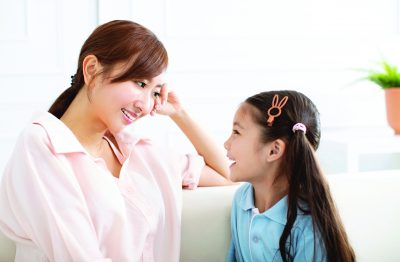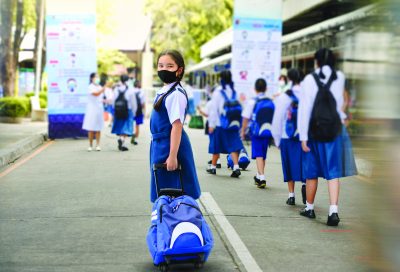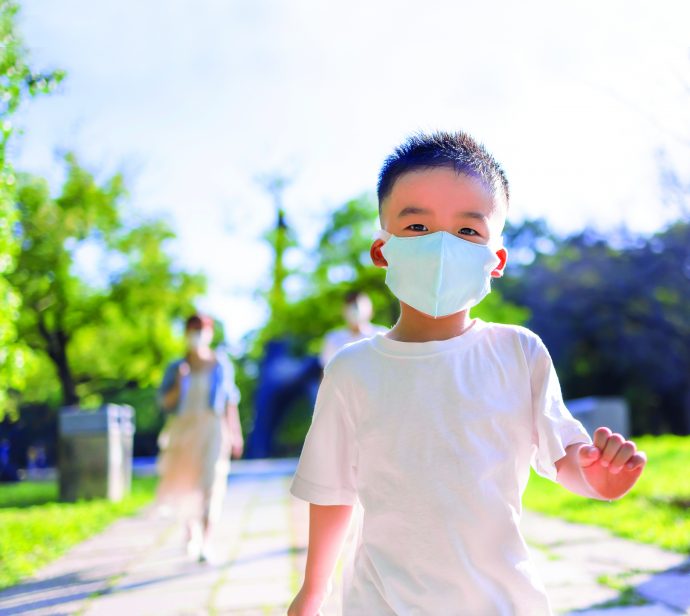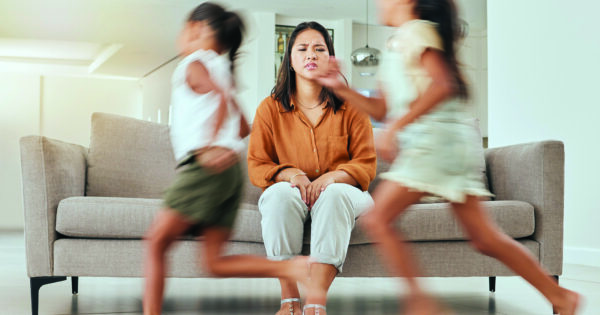COVID-19 took the world by storm two years ago, and since then people everywhere have been gripped by fear. The pandemic was brutal on so many levels because it blanketed communities with sickness, death and isolation, and caused intense economic and social disruption. Its repercussions have been severe and far-reaching, and continue to be felt across the globe.
As we move forward into 2022, however, many have started to pick up the pieces. With more than 90% of the adult population in Malaysia already vaccinated and well on the way to getting their booster shots, there appears to be a glimmer of hope that we can reframe and resume our lives.
Nonetheless, the road to recovery is bound to be fraught with challenges. More so, as parents with dependents looking to us for direction, how do we take care of ourselves so we are better parents for our children? What are the problems we face going back to working at the office and sending our kids back to school? Just how can families adjust to the “new normal”?
Prof Dr Alvin Ng feels that the current situation we are in is beyond a “normal” experience, and this can translate to feelings of stress, anxiety and helplessness.
“The pandemic may continue to have increased adverse long-term consequences not just on adults, but also on children and adolescents. Factors such as bereavement, isolation, loss of income and fear are triggering mental health conditions or exacerbating existing ones. Many people may be facing insomnia, depression and anxiety,” he says.
Datuk Dr Zulkifli Ismail agrees, adding that many are having difficulties at a very basic level, such as acquiring food and earning a steady income. “When this happens, it will have adverse effects on children,” he says.
They are feeding off the anxiety felt by the adults around them including their parents, grandparents and the people around them.
Children are not talking, they are afraid to go out, they are throwing tantrums because they don’t want to leave their homes – these are all cries for help. It’s no wonder then that there have been an increased number of calls made to a range of professionals – development paediatricians, psychologists and speech therapists.
Recognise the red flags

How can parents identify when their child is in need of assistance? Dr Rajini Sarvananthan says parents play a vital role.
“If your child is becoming more fretful or whiny, throwing more tantrums and behaving aggressively, or conversely, turns quiet and withdrawn, both of these behaviours could be red flags.
“Changes in sleep patterns and issues with appetite could indicate something is not right. Parents must always be on the lookout for such signs,” Dr Rajini says, adding that teachers and caregivers also play an important role. “Anyone who takes charge of a child needs to put on their ‘detective hat’ and look out for these changes.”
Often a child may not even realise they are in trouble. While adults may have learnt how to cope and reach out for help, children are at a loss. Dr Alvin explains: “Children, especially the younger set, haven’t yet acquired the vocabulary to express what’s going on within them, or talk about their emotions.”
Children can learn

Dr Alvin suggests that you can pre-empt the red flags by teaching your children about the difficulties they are bound to face, and then training them how to cope. Teach them the skill of reaching out for help if they are stuck, he advises.
“With long COVID, we need to be preparing our children in this manner,” says the clinical psychologist.
“Teach your children how to communicate, not just with their siblings and friends, but with other adults too. You will begin to normalise emotional management this way. If our children can learn this skill now, then when they grow up they will be better prepared to cope with new challenges that are thrown their way.”
Helping teenagers
Meanwhile, teenagers have access to social media and a huge amount of information (as well as fake news) which can be overwhelming and instil fear.
Dr Zulkifli feels that because of this, it is so important to encourage open communication. “Mealtimes are a great time to discuss things. Make sure to put away those digital gadgets and be fully present when your family has meals together. Be open to each other’s views and practise talking about various issues.”
Active listening, especially with children, is also a big part of communicating effectively. Be sure to pay close attention, give your child room to speak and be open-minded.
Dr Alvin suggests that parents also incorporate adaptive behavioural skills when nurturing their kids, for example, how to relax. “The more often you practise relaxation, the easier it is to achieve that state,” he offers.
Problem solving is another great skill to encourage. “Then even if you’re feeling really horrible, you can put your emotions aside and focus on solving whatever problem you are facing. This sort of positive psychology helps one progress in life despite setbacks.”
Quality time and good habits
Even though parents spent a lot of time at home during the Movement Control Orders, many of them, ironically, felt guilty! Because they were just so busy meeting the daily needs of home and work life, many parents were unable to pay enough attention to their children.
Dr Rajini shares that there are little things one can do to overcome this challenge. “You can do things at home that don’t take up a lot of time, but allow you to successfully engage with your children in a meaningful way.”
The consultant developmental paediatrician suggests participating in simple activities that count, for instance making the bed together with your toddler; adding some fun to bath time with baby; ensuring you don’t forget tickle-and-cuddle time; taking a walk or exercising together.
“It doesn’t have to be a ‘big production’. The little things that you do matter, and can be an impetus for open communication, which is one of those big goals you want to achieve with your family.”
Another important point to remember is that we must continue to practise healthy habits: eat well, get enough sleep, stay well hydrated, exercise and keep fit. Socialising and forming meaningful friendships also positively contribute to one’s quality of life.
Embrace spirituality
Spirituality is another great way to deal with stress. It plays a major role in helping us to better cope during difficult times and build strength of spirit.
Regardless of what religion you subscribe to, spirituality can bond families together and contribute to family stability. Research has found that children and teens raised with religious or spiritual practices are more likely to have better mental health and a healthier lifestyle. They have greater life satisfaction, are able to process emotions better, and are more forgiving to those around them.
Dr Zulkifli laments however, that spirituality is often an overlooked component.
“Although it is an aspect of human development, spirituality tends to be ignored in the larger circle of science. Regardless, studies are showing that children do have an innate spiritual capacity and are capable of spiritual experiences,’’ says the consultant paediatrician and paediatric cardiologist, adding that religiosity may even be a factor for lower suicide rates.
Practices such as being thankful, spending time in prayer and meditation, forgiveness, having empathy and helping others, all add to the holistic well-being of a human being.
Spirituality encourages you to think about those around you and make lasting, meaningful connections. It shows you how to understand yourself in relation to others, in relation to the environment and, for those who believe, in relation to a higher being. This can provide one with meaning and inspiration, as well as give one a true sense of belonging.
Back to school

Many children have already started physical school this year. Parents are naturally anxious about their children readapting back to school life.
Dr Zulkifli says we shouldn’t underestimate our child’s resilience. We should encourage them not to revert to isolation, but also advise them how best to take care of themselves.
“It is important that they mustn’t lose opportunities for social interaction. We must teach our kids to have empathy for those around them, and not ostracise or alienate anyone, while still following the SOPs – socially distancing themselves, wearing masks and washing hands.
“It’s important for us to strive for the right balance so we prevent our children from growing up into obsessive compulsive adults!”
Dr Zulkifli recommends that parents take a keen interest and actively liaise with teachers and the school authorities to understand the procedures that the schools are taking including vaccination of staff, masking, sanitisation, air circulation and social distancing.
All work and no play
The experts also caution parents not to put too much pressure on their children to catch up with learning that was lost during the pandemic.
Dr Rajini advises: “Children still need exercise and outdoor play. They have been stuck indoors in sterile environments for too long so having that ‘messy play’ time is so important to reboot their systems. Do allow your children to go out and socialise (while observing SOPs). It’s going to take some time for them to get used to sitting down for long hours in a classroom again.”
Finally, if you still feel anxious or overwhelmed or have a concern about your family or children, remember that we live in a community and you don’t have to bear any burdens alone.
Reach out to the people around you. If you need a listening ear, talk to someone. If you need help, ask. If the people in your social circle cannot assist, try reaching out to helplines, or seeking professional help.







Comments